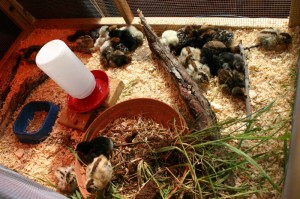This is the general chicken feeding page. In short: the more natural you can keep your chickens and the better the genetic stock, the healthier your chickens are gonna be.

Bottom line for me: do what works for you while keeping your chickens healthy without having to resort to “medications” – but try to imitate the most natural range of foods you can when raising your chickens. I am a firm believer in Natural Chicken Raising, no vaccines, no antibiotics and such. Feeding your chickens also includes impressions: the environment they are raised in – the space, stimulation and care – they are such curious little guys.
There are many ways to feed chickens. Just consider: If you have a free ranging mother hen – she will feed her chicks all kinds of plants and bugs from day 1. If you start like me – getting chicks in the mail, you’ll likely start with a chick starter commercial feed. Since I am convinced that mother nature knows better than any lab what is best for chickens – and considering the omnivorous nature of chickens, I exposed my baby chicks in the brooder to clumps of earth on it in the first few days and fed them various soft cooked veggies from the start too – as a side effect, it seemed to help with the fluid intake in the summer. They love overcooked zuccini. Also, I had made my own Kefir and mixed it with the leftover powder from the crumbles to colonize their gut with “good” bacteria.
In times of any stress, I do give them boiled egg too.
Store bought feeds -> organic only – if at all possible
Since one of the reasons I am raising chickens was to have organic eggs from free range chickens – I chose from the start only organic chicken feed, whether it be starter crumbles, layer or the various scratches. It is not cheep. I am too new at this to go into how to mix your own chicken feed, but one thing I did know: I did not want pesticides or GMO genes in my chickens or eggs. I might as well just by commercial eggs if I did.
Start with Chick Starter – the you can go on to layer feed at 20 weeks, actually, my first chicks were only a little over 4 months …so 20 weeks might be late, but they were eating egg shells that was in the kitchen scraps, so no worries. Once they lay, they will need a source of calcium, whether egg shells, oyster shell or layer feed. NO LAYER MIX for babies, bad for they renal system.
I never switched to grower because of the kitchen scraps – I wanted to keep the higher protein food of the starter feed.
Some folks getting into mixing their own and yes, don’t be afraid to entertain that option. If you have the space, you can also grow your own.
Free range plants and bugs
From the start, the chicken were meant to roam free in the garden part available to them. They got “out” of the coop at 6 weeks. I suppose what I do is technically considered “pastured” – so they free range in an un-kept parcel of the garden where they find grass, seeds, other plants and bugs and worms and mysterious things in the dirt.
Some days they “free range” in the run with the straw mulch and scraps – and they LOVE it when I turn it over for them ….there seem to be lots of “bugs” under there.
Having a forest floor deep litter coop is another source of “free range” – I can’t for the life of me see what some of the chickens are finding down there ….I am sure though that they are not going through all that work to find old crumbles or scratch ….
Vegetable and fruit kitchen scraps – cooked and raw
All organic material from the kitchen is headed for the compost pile in the chicken run – and they love it. This provides things like carrots and squash and beans and lettuce and …keep the list going. Whatever they don’t eat, gets composted. Make sure NOT to include avocado skins and pit
Treats
Meat-scraps and boiled eggs and broccoli heads, in the summer: corn on the cob (organic only) mostly the leftovers from meals, a grape here and there (they loved those, just that you don’t want to overdue anything sugary). I use these deliberately to get them to come to me. My second set of chicks is MUCH more shy as I have not been spending as much time with them and the older ones make sure they get first access. Mealworms when I can get them fresh (in the summer)
A word on DE diatomaceous earth.
Hm ..at first it seemed like a good idea – as it kills lice and mites … and I did put some in the dust-bathing spots they chose, inside and outside the coop. The problem is – the stuff kills the good bugs too. So I might be using wood ash for lice and mite control if I ever need to – and MAYBE as a treatment option if they ever do get infected…so far dust bathing has kept them clean.
No more diatomaceous earth in my coop.
I have not yet experimented with fermented foods, worm bins or soldier fly grubs – all seem like a good idea and are on the to do list.
DON’T: no avocado pit and skins, no raw/uncooked beans or potato peels, no chocolate – nothing downright rotten, not too much salt ….
